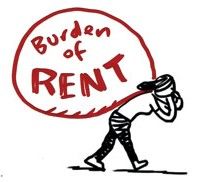Health and Housing: New Study links private rent with risk of infection and stress

According to a research paper published in the Journal of Epidemiol & Community Health by Dr. Amy Clair and Dr. Amanda Hughes[1], and using demographic characteristics and health behaviours taken from the UK Household Longitudinal Study, private renters had significantly higher level of CRP (C-reactive protein, the biomarker associated with infection and stress) than owners with a mortgage, meaning they were more likely to experience stress and infection. Social Housing tenants have the highest CRP, although there is some overlap with private renters. Those in receipt of housing benefit (the UK equivalent of the Irish Housing Assistance Payment (HAP) or Rent Supplement) also had higher instances of CRP than those not in receipt of benefits. Conversely, those experiencing ‘housing cost burden’ (where housing costs exceed 30% of household income and household income is below the poverty line) had lower CRP than those not experiencing ‘housing cost burden’. There was also a link between accommodation standards and CRP, with those having trouble heating their home showing high levels of the biomarker.
When all other variables were controlled, tenants in private rented accommodation experienced the highest levels of CRP. So, what does this mean for Irish housing policy and the 708,825 people living in private rented accommodation?
Private Rent in Ireland
A paper presented by Prof. Tony Fahey at the Social Justice Ireland 31st Annual Social Policy conference (see video here, read the paper here) discussed how home ownership rates were falling among younger households, from 69% of 25-34 year olds in 1991, to just 30% of this age group in 2016, meanwhile the cost of private rent has risen in this period from 19% of household expenditures in 1994-5 to 27% in 2015. The response of respective Governments has been primarily to continue to rely on the market to ‘right’ rent inflation, however this has patently not worked. While the rate of rent inflation in Dublin has started to ease (having increased by at least 84% since 2011), rents in cities outside of Dublin experienced an average increase of 15.8% to the year ending Q3 2018[2].
Government subsidies to the private rented sector in the form of HAP reportedly reached €276.6 million in the first three quarters of last year. This is set to increase given the slow rate of construction of social housing and the continued reliance on the private sector to provide ‘social housing solutions’. In fact, HAP accounted for 73% of all social housing output in the first three quarters of 2018.
Rent Standards
According to the Department of Housing, Planning and Local Government’s Guide to Minimum Standards in Rented Accommodation, a landlord must provide:
- A water closet with a dedicated handwash basin with hot and cold water
- A separate room, for the exclusive use of each rented unit, with a toilet, a washbasin and a fixed bath or shower with hot and cold water
- A fixed heating appliance in each room, which is capable of providing effective heating and which the tenant can control
- Where necessary, suitably located devices for the detection and alarm of carbon monoxide
- Facilities for cooking and for the hygienic storage of food including, a 4-ring hob with oven and grill, fridge-freezer and microwave oven
- Access to a washing machine
- Access to a clothes-dryer if the rented unit does not have a private garden or yard
- A smoke alarm and fire blanket
- Access to vermin-proof and pest-proof refuse storage facilities
In 2017, 16,261 private rented properties (approximately 4.5% of all private rented properties registered with the Residential Tenancies Board) were inspected. Of this, 12,833 (79%) failed to meet these regulatory requirements.
Health and Housing – What next for Ireland?
These are the facts:
- Private rented accommodation is increasing among young families in Ireland.
- The rate of private rent inflation continues in double digits.
- Just 4.5% of private rented properties were inspected in 2017 and, of those, 79% failed to meet the basic standards.
- A private rented subsidy (HAP) accounted for 73% of all social housing output in the first nine months of 2018.
- According to recent research undertaken in the UK, private renters are more prone to stress and infection.
Government policy of reliance on the private rented sector is not providing sustainable, long-term housing solutions. It is failing in its most basic objective. Millions of euro in Exchequer funds are being used to subsidise an increasingly profitable market. It seems likely that millions more will be needed to address the associated health issues in the coming years.
Social Justice Ireland has previously urged Government to address the housing crisis through:
- Building more social and affordable homes and allowing local authorities and Approved Housing Bodies access financing to support this.
- Developing a system of 'affordable rental' through an off-balance sheet model of Cost Rental.
To read Prof. Tony Fahey’s paper in full, click here.
To read the article ‘Housing and Health: new evidence using biomarker data’ in the Journal of Epidemiol & Community Health, click here.
To read Social Justice Ireland's Cost Rental proposal, click here.
[1] https://jech.bmj.com/content/early/2019/01/05/jech-2018-211431
[2] https://www.daft.ie/report/2018-Q3-rentalprice-daftreport.pdf